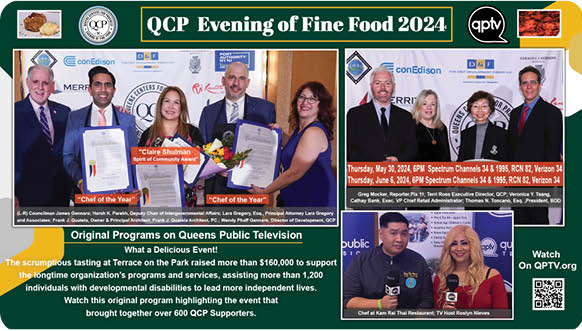By Daleelah Saleh | news@queensledger.com
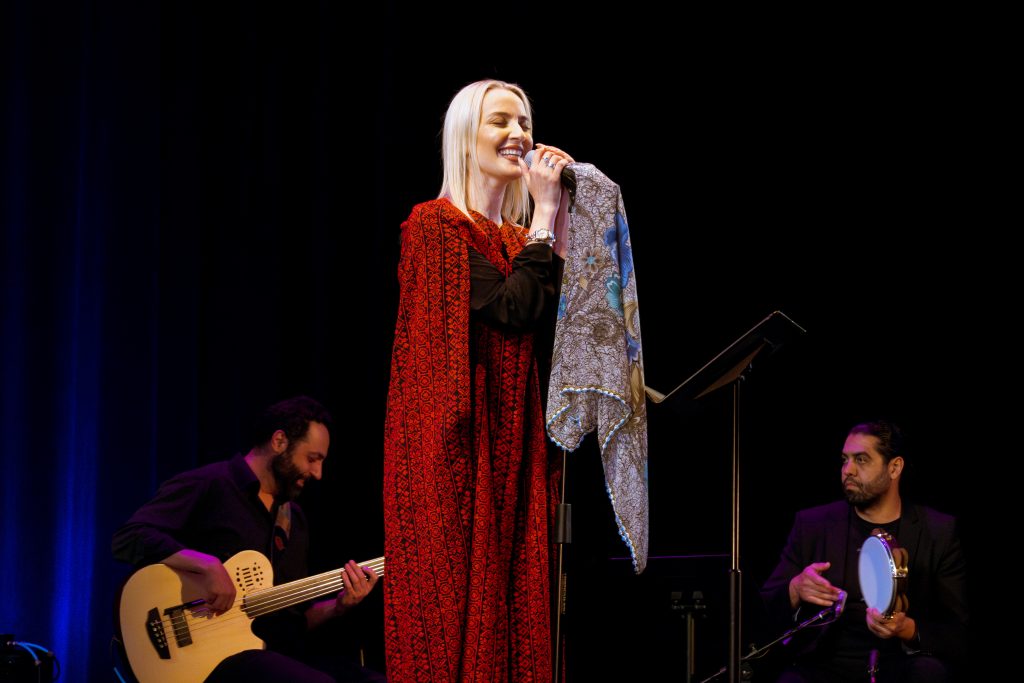
Bashar Farran, Nibal Malshi, and Gilbert Mansour (left to right). Credit: Daleelah Saleh
On Friday, May 17th, Flushing Town Hall hosted the Nibal Malshi Quintet for a concert showcasing music from across the Arab world, including Palestine, Egypt, Syria, Lebanon, and Iraq.
The concert was part of Flushing Town Hall’s mission to bring global arts to a global audience through world music programming (among other events).
“Flushing Town Hall showcases the talent and cultural traditions of artists from all over the world, as a way to bring people together,” Ellen Kodadek, executive and artistic director of Flushing Town Hall, said in a press release. “We are proud to welcome the extraordinary Nibal Malshi Quintet to our theater. Nibal sees her work as a platform for positive change and a message of peace and humanity.”
Sami Abu Shumays, the deputy director of Flushing Town Hall, built upon this sentiment: “It’s been an honor to have Nibal here. It’s really important for us to be able to show Palestinians as human beings, as people with culture and music and joy rather than the way that Palestinians are often misrepresented in our media.”
The event started at 7pm, with an interactive percussion workshop led by Gilbert Mansour, a Berklee College of Music graduate percussionist who has performed with The Lebanese National Symphony Orchestra and has accompanied various renowned Middle Eastern artists around the world.
Gilbert sat in a chair in front of the stage facing the audience, engaging with them every step of the way. He started out by introducing two of the main percussion instruments played in the Arab world: the riqq, a small, circular drum resembling a tambourine, and the tabla (also known as Doumbeck or Darbuka), a goblet-shaped drum.
He demonstrated some of the classic iqa’at, or rhythms, that many Arab songs are built around and explained how each rhythm and beat changes regionally. For each new rhythm he introduced, he had the audience practice by clapping it out. Audience members were invited to sing along to the beat and demonstrate dabke, a traditional dance from the Levantine.
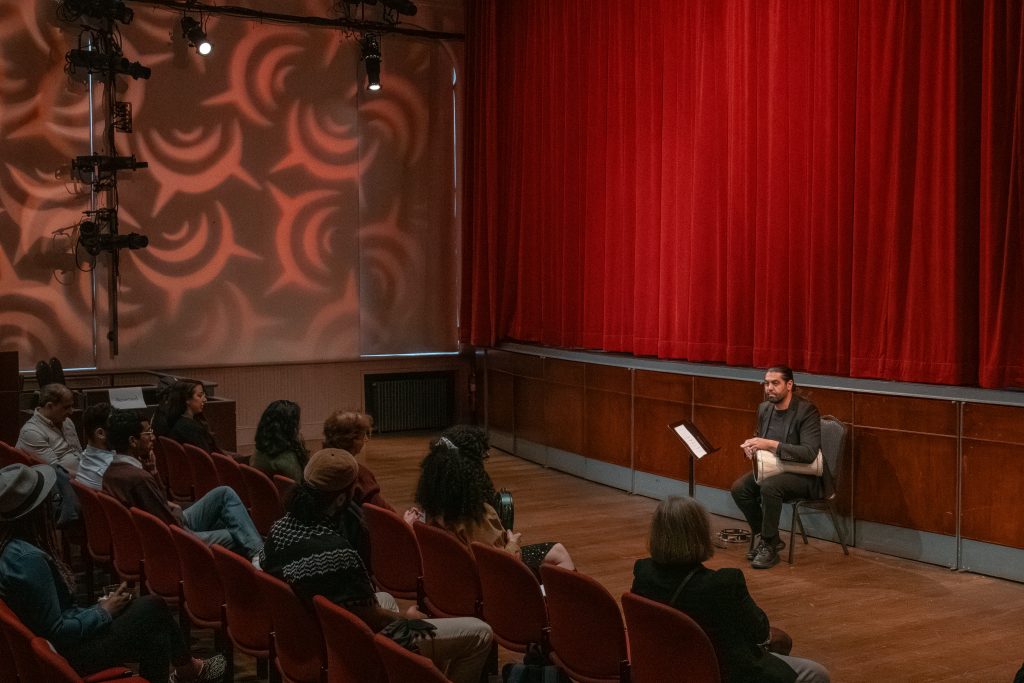
Gilbert teaching drum lesson. Credit: Daleelah Saleh
When asked how long he had been playing during an audience Q&A, Gilbert shared that “these instruments have been in me since I was nine years old”. He noted that he used to tap out different beats on a door during the Lebanese war, then learned how to play the tabla once the music conservatory reopened.
He has been teaching for the past ten years, and loves “connecting people with other countries and seeing people learn something new.”
After a quick break, the curtain opened to Gilbert on stage with his riqq and tabla, as well as Gabriel Dahrieh on violin, Maurice Chedid on oud, Zafer Tawil on qanun, and Bashar Farran on bass. They played an instrumental, then Nibal was met with resounding applause as she walked on stage, donning a traditional Palestinian thobe, with an embroidered design, known as tatreez.
She opened the set with “Rajeen ya Hawa” by Fairouz, which translates to “We Are Coming Back, Oh Love.”
Nibal later shared that she chose that song because “We all know what it’s like to miss home. Rajeen is about going back home, longing for your memories, the nature of your homeland, and your bedroom. There’s nothing like home, it hurts us to leave regardless of the reason. You have roots in the land no matter where you go.” She also shared that Fairouz and Umm Kulthum were huge inspirations for her growing up – so naturally it felt fitting to pay an homage to both ofthem in the performance.
Over the next hour and a half, she guided us on a musical journey throughout the Arab world, singing classics from Syria, Lebanon, Egypt, Palestine, and Iraq. She introduced each new region as she went, and invited people to clap and sing along.
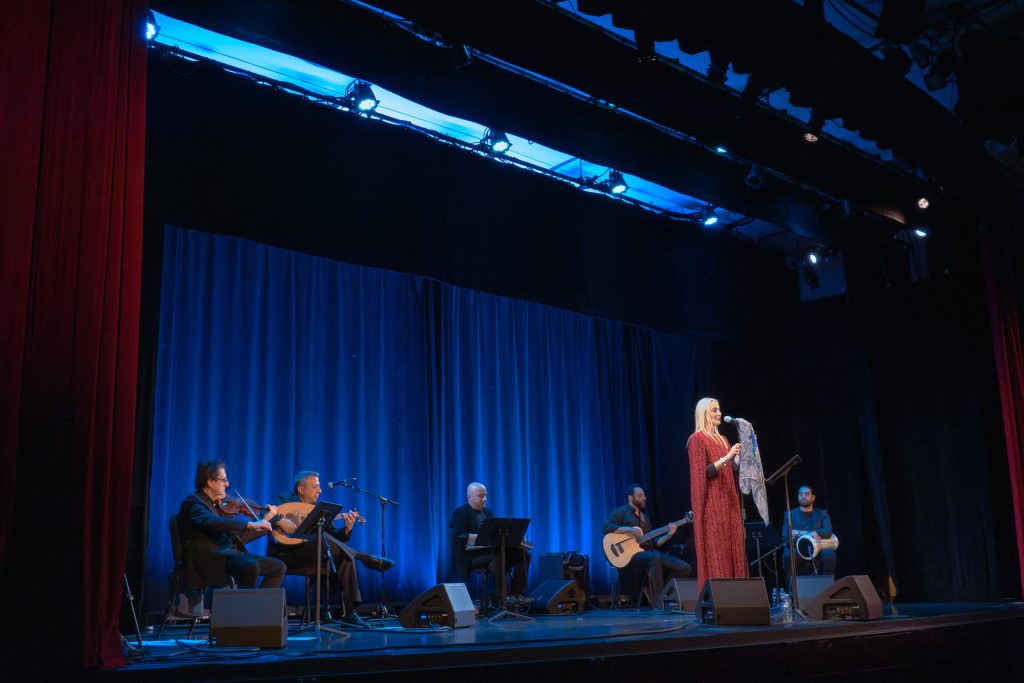
Nibal and quintet. Credit: Daleelah Saleh
The show felt like a gathering of old friends that just so happened to take place at one of the most iconic venues in Queens and include one of the most renowned Palestinian singers.
“Music is an international language that people can connect to regardless of lyrics,” Nibal said. “Whether or not they knew the song, people were singing and moving together. That’s why no matter how far away from home I am, I don’t feel like I’m a stranger on stage; I feel at home.”
While Nibal currently lives in Dallas, she has played in NYC before. “I always love coming back and everyone knows the music. And it’s always interesting to meet new people and see familiar faces.”
Hailing from Haifa, Palestine, Nibal has always seen music as a way to build bridges and connect people, but shared that over the past 6 months, she has felt the weight of that responsibility even more: “It’s a duty for me as an artist and musician to show the beauty of my culture and people, and I feel like my home shines through me.”
Gilbert shared this sentiment, saying, “I want to bring awareness to where I’m from, that’s a large part of why I play these instruments and why I teach,” and shared a message to people less familiar with Arab music and culture.
“Listen to our music, come to our concerts, and get rid of the stereotypes of camels and music.”
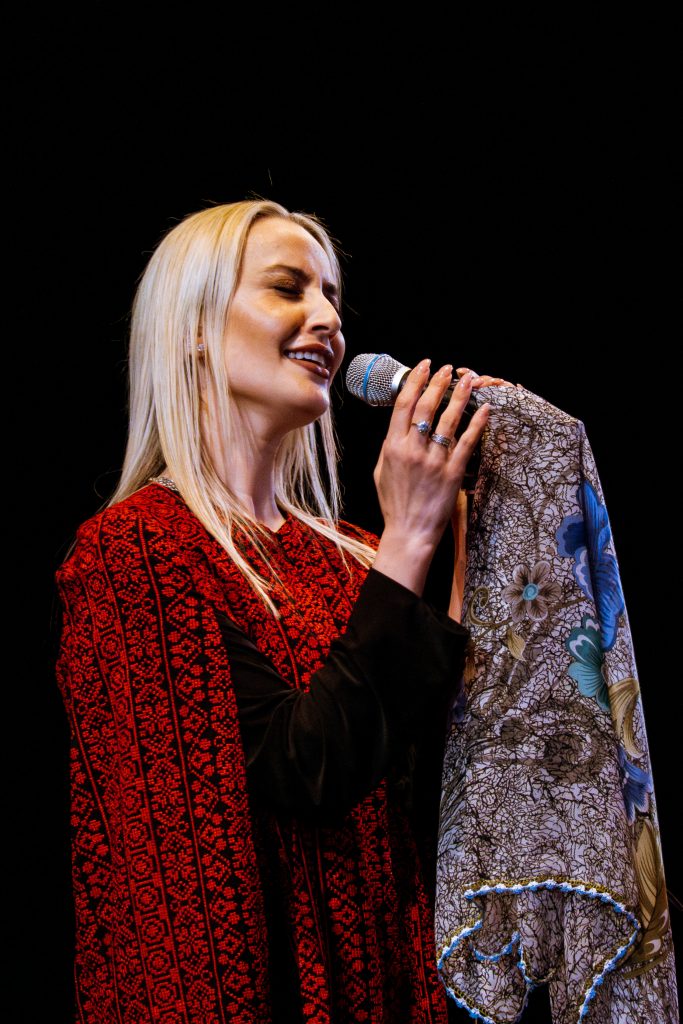
Nibal Malshi. Credit: Daleelah Saleh



